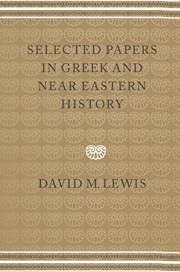Book contents
- Frontmatter
- Contents
- List of plates
- Preface
- Systems of reference
- GENERAL
- ATHENIAN
- 9 Public property in the city
- 10 Cleisthenes and Attica
- 11 Review of J. S. Traill, The Political Organization of Attica
- 12 Review of P. Siewert, Die Trittyen Attikas und die Heeresreform des Kleisthenes
- 13 The Kerameikos ostraka
- 14 Megakles and Eretria
- 15 The Athenian Coinage Decree
- 16 Athena's robe
- 17 The treaties with Leontini and Rhegion
- 18 Entrenchment-clauses in Attic decrees
- 19 Apollo Delios
- 20 After the profanation of the Mysteries
- 21 Aristophanes and politics
- 22 Who was Lysistrata?
- 23 A note on IG i2114 [= i3105]
- 24 The epigraphical evidence for the end of the Thirty
- 25 The financial offices of Eubulus and Lycurgus
- 26 The dating of Demosthenes' speeches
- 27 Law on the Lesser Panathenaia
- 28 The Athenian Rationes Centesimarum
- 29 The chronology of the Athenian New Style Coinage
- 30 Review of M. Thompson, The New Style Silver Coinage of Athens
- NEAR EASTERN
- Bibliography
- Publications of David M. Lewis
- Indexes
21 - Aristophanes and politics
Published online by Cambridge University Press: 15 January 2010
- Frontmatter
- Contents
- List of plates
- Preface
- Systems of reference
- GENERAL
- ATHENIAN
- 9 Public property in the city
- 10 Cleisthenes and Attica
- 11 Review of J. S. Traill, The Political Organization of Attica
- 12 Review of P. Siewert, Die Trittyen Attikas und die Heeresreform des Kleisthenes
- 13 The Kerameikos ostraka
- 14 Megakles and Eretria
- 15 The Athenian Coinage Decree
- 16 Athena's robe
- 17 The treaties with Leontini and Rhegion
- 18 Entrenchment-clauses in Attic decrees
- 19 Apollo Delios
- 20 After the profanation of the Mysteries
- 21 Aristophanes and politics
- 22 Who was Lysistrata?
- 23 A note on IG i2114 [= i3105]
- 24 The epigraphical evidence for the end of the Thirty
- 25 The financial offices of Eubulus and Lycurgus
- 26 The dating of Demosthenes' speeches
- 27 Law on the Lesser Panathenaia
- 28 The Athenian Rationes Centesimarum
- 29 The chronology of the Athenian New Style Coinage
- 30 Review of M. Thompson, The New Style Silver Coinage of Athens
- NEAR EASTERN
- Bibliography
- Publications of David M. Lewis
- Indexes
Summary
Aristophanes is unquestionably news. The Lysistrata is drawing its crowds in Sloane Square, in an admirable production, which certainly doesn't merit its description as a ‘travesty, emanating, I believe, from Oxford’, given to me by a desiccated Cambridge don, though it may be thought that certain of its deeper elements have perhaps necessarily been played down. The translations of Messrs Dickinson and Fitts into English and American hurry alternately from the presses, while, if neither form of Standard English meets your taste, three shillings and sixpence sent to Mr Douglas Young of St Andrews will produce a translation into Lallans of the Puddocks, enlivened with references to Frankie Vaughan and Mr Kruschev, and enriched with learned notes and references to Liddell–Scott–Jones–Mackenzie and their ‘muckle lexicon’. It therefore seemed appropriate, when a paper was needed on this occasion, to resuscitate for your benefit a paper which I gave in France a year ago. I have no other motive, except possibly to start a fight among the undue number of learned attendants at this meeting. I don't think it possible to cover my ground in a short time, and I am uneasily aware of the traces that will show through my paper of the efforts to be elegant, Gallic and not shock the French too much which formed a large part of the original version.
I have had to change things. There is of course no call here to begin, as I did in France, with a description of what Mods is and what Greats is and how they differ.
- Type
- Chapter
- Information
- Selected Papers in Greek and Near Eastern History , pp. 173 - 186Publisher: Cambridge University PressPrint publication year: 1997



